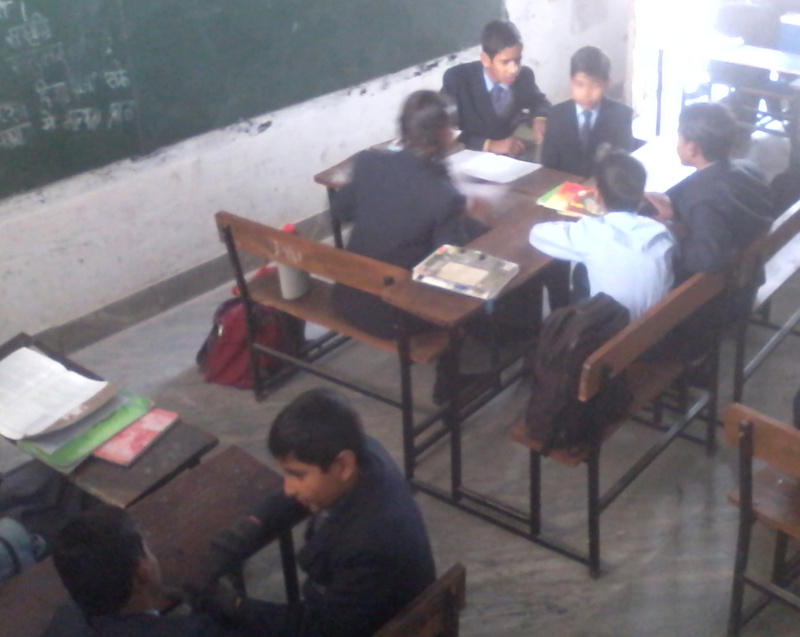I visited many alternative schools and wrote short articles about them as part of a fellowship I had with Wipro Applying Thought In Schools (WATIS). These articles were later published as a regular column in the Teacher Plus magazine. I will post some of these articles here to highlight the variety of experiments going on in the alternative schools of India.
The first post in this series is about Muni International school. The original article is available on the Teacher Plus site here.

Among all the schools featured on my list, Muni International is undoubtedly the most politically incorrect one.
Consider the following:
– Their daily prayer asks for a blessing from Maa Saraswati.
– The school promotes Jeevan Vidya, Agrahar Nagraj’s system of spiritual thought, to all its students.
– Ashok Thakur, the founder/ principal, cheerfully claims ignorance of what most people would consider foundational aspects of education.
– The school website has videos of Ashok Thakur talking, sitting next to Swami Ramdev.
No, don’t stop reading just yet, because this is a heartening story of a departure from the norm so extreme that it may potentially switch on some dusty, unused light bulbs in your head.
I met Ashok Thakur when he was conducting a training session for teachers in a school run by a friend in Ahmedabad. Ashokji was talking about education and everything he said, even the radical things like not using any textbooks, seemed completely right, as he spoke with the conviction of a practitioner, using real examples from his school in Delhi. When the session was over and my friend and I asked him more about his interesting experiments in schooling, he invited both of us to come to Delhi and see for ourselves. So, it came about that, a few months later, we drove down potholed roads in a down-market part of West Delhi and reached the four-storied building that houses Muni International School.
This happened many years ago but the visit is bright in my memory. Bright with the vibrant brightness of the children we met, their bubbling enthusiasm and joy in showing off their school and their many talents, their comfort level with us as if we were close relatives visiting after a long time, and treating us as if we were on a short visit and were to be made the most of. The whole school seemed full of children comfortable with being around adults! One thing that Ashokji figured out early was that if you make small children speak more than one foreign language every day, by the time they finish school, their fluency will at least guarantee employment. Meanwhile the academic qualification needed could be worked on peripherally and without too much stress. So all the children we met spoke English but they also wanted us to hear German songs and French poems and wanted us to watch them enact Japanese skits. Even the very small ones from the primary section! It was truly breathtaking!
We started with a bullet-point list of ‘political incorrectness’ so perhaps it is fitting that we counterbalance that with a list of ‘educational correctness’. Here is a partial list:
– There are no textbooks used in the school. The syllabus from NCERT is used to anchor the learning and the children question, discover, and explore the subjects with the help of their teachers and using the available online and offline resources. The focus is on anchoring learning in experience. Ashokji mentioned that a tree that has its leaves arranged such that every leaf gets sunlight is a great way to learn geometry.
– The school parliament has school level MPs, class level MLAs, Councillors, judges, committee members, etc., who are elected from within the classrooms every month. The same child is not allowed to get elected to the same post more than once.
– The school caters to the underprivileged families in the neighborhood.
I remember Ashok Thakur saying that his 8th standard children competed with MA students from a nearby university, the task being to read from a book that nobody had read before and answer questions from it, and the children from Muni International, who had effectively learned how to learn, won hands down. I can well believe it!
Quick facts:
Name of school: Muni International school
Been around since: 2003
Number of teachers/ staff: 40
Number of children: 700
Classes handled: 1 to 12
USP: Caters to poor children. Emphasizes foreign language learning for livelihood security.
Location: Uttam Nagar, New Delhi
Website: http://www.muniinternationalschool.org/